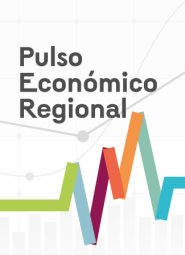A Constitutional Reform Bill is currently under consideration in the Congress of Colombia that would substantially increase the percentage of the nation's current revenues to be transferred to territorial entities. This proposal implies a transfer of responsibilities and competencies from the Central National Government (CNG) to subnational governments, which is yet to be defined. Without a corresponding transfer of fiscal responsibilities, the bill would significantly increase total government spending, posing substantial macroeconomic risks.
A recent report by the Fiscal Analysis Group at Banco de la República (the Central Bank of Colombia), published in the series Working Papers on Economics (Borradores de Economía), analyzes these risks. It examines scenarios where no equivalent reduction in CNG expenditures accompanies the increased transfers. Graphs 1 and 2 exhibit projections of the government’s fiscal deficit and net debt as a share of GDP, under scenarios with and without the enactment of the bill, using projections from the Medium-Term Fiscal Framework (MTFF) published by the government in mid-2024.
Projections of the General Participation System (GPS) in case there is no reform, the fiscal deficit would stabilize at around 2.8% of GDP as of 2030, and the CNG’s net debt would remain close to 55% of GDP over the next fifteen years. It is worth noting that the MTFF incorporates a gradual increase in tax collection over time, which may not occur, especially considering the lower tax collection already observed following the publication of that document.
It should also be noted that, even without a reform to the General Participation System, the projected increase in GPS transfers would still be substantial, increasing from 4.2% of GDP in 2024 to 5.6% of GDP in 2028 and further increasing in the following years to 5.9% of GDP in 2038. For this same reason, compliance with the fiscal rule in the coming years requires significant austerity in the CNG’s spending over the next few years in all areas other than the GPS. The reform currently under review in Congress makes this challenge even more complex, as the government would be forced to increase transfers more sharply, reaching 7.2% of GDP by 2038, that is, 1.3 percentage points of GDP above the MTFF forecast and three percentage points of GDP above its 2024 level.
From a purely accounting perspective, the increase in transfers projected by the Constitutional Bill currently under discussion in the Congress of Colombia would result in an increase in the CNG’s fiscal deficit from 2.8% to 4.7% of GDP by 2038 and an increase in the CNG’s net debt from 54.9% to 64.6% of GDP. These calculations suggest that, under the given assumptions, the CNG would fail to meet the fiscal rule, even if the MTFF’s tax revenue assumptions were met and the government could adjust other expenditures as outlined in that document.
Graph 1. CNG Fiscal Deficit
(percentage of GDP)

Graph 2. CNG Net Debt
(percentage of GDP)

Source: Author’s calculations based on the 2024 Medium-Term Fiscal Framework, Ministry of Finance and Public Credit and National Planning Department (DPN). The fiscal rule’s anchor and limit levels are taken from Law 2155 of 2021.
These accounting calculations are conservative and overlook additional macroeconomic effects of the proposed policy, which would arise from its impacts on the public debt risk premium, the exchange rate, foreign trade, and overall economic activity. The report prepared by the Fiscal Analysis Group at Banco de la República analyzes these effects using a macroeconomic equilibrium model, estimating that the reform would lead to a 150 bps increase in the CNG’s financing costs caused by the increase described in the fiscal deficit and the non-compliance with the fiscal rule, which is consistent with international evidence in similar situations.
The exercise exhibits that the macroeconomic effect of the reform to the GPS is substantial in a scenario where the CNG’s expenditures fail to be reduced in an offsetting manner. By 2035, GDP would be 11.6% lower than in the baseline scenario due to declines in consumption and investment of 18% and 30%, respectively. The reform would result in public spending being 2.7% of GDP higher than projected in the MTFF, largely due to higher interest payments and a 28% of GDP increase in public debt, above the current 55% anchor set by the fiscal rule.
The conclusions of the report generally align with the analysis of the Colombian Comité Autónomo de la Regla Fiscal - CARF (Colombian Autonomous Committee for the Fiscal Rule) regarding the effects of the Constitutional Bill. Starting from a situation where public finances are already significantly vulnerable, the proposed reform to the GPS would further intensify the adjustment effort required in the rest of the CNG's public spending. This could be exacerbated by the impact on country risk premia, external borrowing costs, and the depreciation of the Colombian peso.
In addition to the risks described, the proposed reform to the GPS seriously limits the country’s ability to make fiscal adjustments when required. On the one hand, new or increased tax revenue must be shared with the regions without an explicit counterpart of savings on their part. On the other hand, required adjustments in public spending may be more difficult to achieve when a large fraction of spending is managed by different levels of government.
As the authors of the document prepared by Banco de la República state, even if the redistribution of responsibilities allowed for compensating the increase in the GPS through lower National Government spending in other areas, there are additional risks that threaten the sustainability of public finances. The low management and execution capacity of some regions could force the central government to incur into expenditures that fall under the responsibility of those regions, as is currently the case with expenditures related to the health sector or tertiary roads in the poorest and most isolated municipalities. Even in cities with greater administrative capacity, it is difficult for the government to completely withdraw the support it has been providing through future commitments for major investments in mass transportation systems and infrastructure in general.
There is also concern about the unintended implications for the territorial entities of re-linking transfers to the nation’s current revenues, a variable that can be highly volatile. Precisely, this volatility led to the current rule, where transfers adjust based on a four-year moving average of the nation’s current revenue growth rather than on the previous year’s performance.
These considerations are relevant to the ongoing discussion and definition of the Constitutional Bill currently in Congress and the accompanying law on competencies.































































